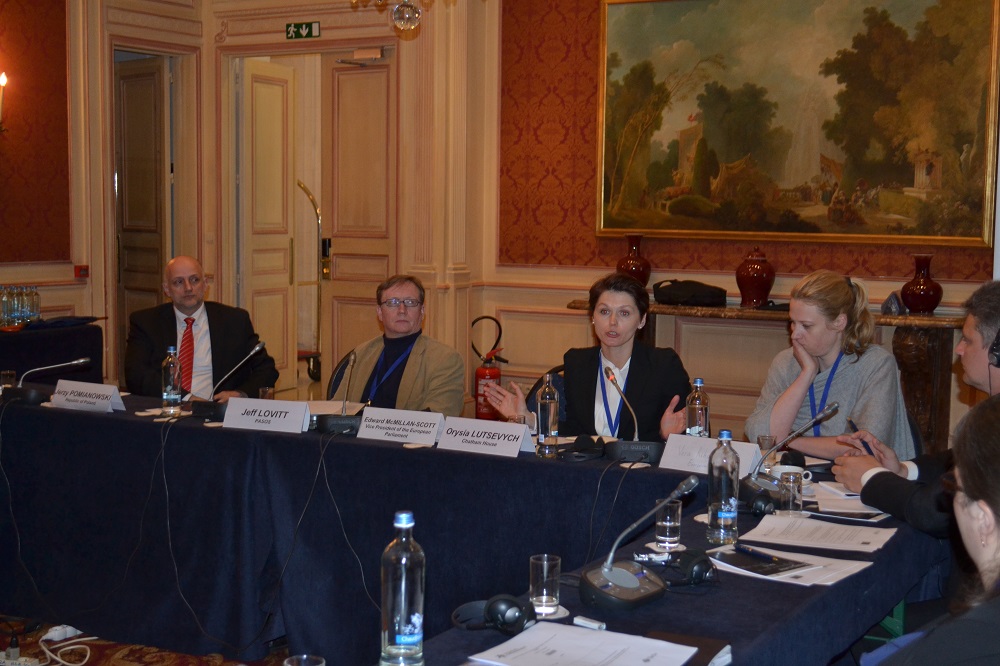|
IN THE SPOTLIGHT |
Eastern Partnership Civil Society Forum
|
|
The European Endowment for Democracy – a driver for change?
Within the framework of the WG1 meeting on 14 May 2013, an expert panel on the topic of “The European Endowment for Democracy – a driver for change?” was organised jointly by the EaP and the Policy Association for an Open Society (PASOS). Four key speakers shared their views on the topic with the audience: Jerzy Pomianowski, Executive Director of the EED and Undersecretary of State at the Ministry of Foreign Affairs of the Republic of Poland; Edward McMillan-Scott, Head of the European Parliament Democracy Caucus; Vera Rihackova, Senior Research Fellow at EUROPEUM Institute for European Policy; and Orysia Lutsevych, Robert Bosch Fellow 2012 at Chatham House. The discussion was moderated by Jeff Lovitt, the Executive Director of the Policy Association for an Open Society (PASOS). Mr Pomianowski informed that the secretariat of the EED will be comprised of 12 people and the available budget amounts to €25 million until 2015, although a German contribution to the EED is still missing. He expects the EED to be operational in early August and beneficiaries should be able to receive funding from autumn onwards. The operational model of the EED should be less bureaucratic as the Endowment is a mix of an intergovernmental and NGO approach. He stressed that there will be no announcement for a call of proposals. Instead the EED will work with an open finance cycle and handle proposals as they are received, which should enable quicker replies. If the EED rejects a project, this will be done in three ways: First, definitive no, if the EED does not see any value-added in the project. Second, if a value-added is identified, but the project is either too big or not addressing the EED’s priorities, technical assistance to find alternative sources of funding will be provided. Third, if the project is too big for EED to fund or too risky, the EED will help in identifying possible co-funders. The thematic priorities of the EED were presented as, first, providing “seed money” to help new organisations or unregistered organisations in places with unfavourable operating environment, second, providing bridging support to NGOs between projects; third, supporting democracy through the use of innovative tools like technology, art or culture; and fourth supporting cross-cutting activities for political leaders. Furthermore, Mr Pomianowski stated that an early warning system might be a side product of the EED, but stressed that the key activity of the Endowment is to provide funding. Ms Lutsevych emphasized the problem of an NGO-cracy that can be observed in all EaP countries. She stressed the need for NGOs to reach out to society and attract real members as this will lead to a demand-driven approach, make them accountable to society and work as checks and balances within the organisation. According to her, the EED should aim at mobilizing change-minded citizens and also work on the local level, for example by supporting grass-root-groups, as the real change takes place there. Vera Rihackova underlined that the establishment of the EED is a huge success for democracy support, but the new organisation faces an enormous pressure to show its added value. She identified the sustained political support and funding after 2015 as the key long-term challenges for the Endowment and stressed that the Forum can be instrumental in advocating EU member-states to provide their financial contributions to the EED Mr McMillan-Scott highly welcomed the establishment of the EED, for which he lobbied for a long time and which got the final impetus from the Arab Spring revolutions. He expressed concern that some EU member states like Germany or the United Kingdom do not contribute to the EED, but stressed that new member states which experienced the value of external support in the past see the added value of the Endowment. The fact that the initiative came from Poland, also facilitated the establishment of the EED. For more information on the WG1 meeting, in the framework of which the panel discussion was organised, see here. Audio recordings of the Panel on the European Endowment for Democracy: |
Project funded by the European Union
![]()








